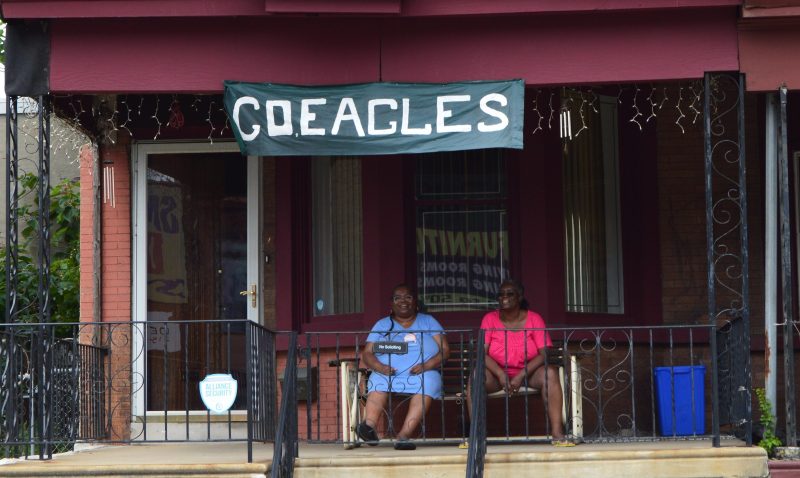Philadelphians are known for their distinctive affinity for their home sports teams
Philadelphia sports fans have quite the reputation. From “burning down the city” to dragging down opposing team’s enthusiasts, fans of the city’s national sports teams are constantly criticized for their ornery nature. However, history shows that Philadelphia sports fans are so much more than that.
“I grew up assuming the way Philly sports fans act is the way all sports fans act,” said ONA23 attendee Alexandria Mansfield, a Philadelphia fan and reporter at the Florida Times-Union.
A few years ago, sports fandom took on an unexpectedly important role in her life in a way it never had before.
During the 2017-2018 season, the Eagles made it all the way to Super Bowl LII against the New England Patriots as the underdogs — Mansfield’s father passed away not long before the game.
Her family watched the playoff games at the hospital, hoping he would stay alive so he could see the Eagles play. Once the game began, they felt like he was there watching the game with them.
“I’ve never been an emotional sports person,” Mansfield said. “I was sobbing when we won because I know he would have been so happy to see that. This leans into how much it’s in our heart and soul in Philly.”
“It really eased the grieving, even though it’s something so far removed from me.”
“Even if you’re not from here, it’s sort of that infectious energy when you’re rooting for something that’s entirely out of your control. That can dampen your spirits at times or really lift you up when you need it,” said Maria Pulcinella of WHYY, Philadelphia’s NPR affiliate, on the spirit of Philadelphia’s sports fans.
There is something to be said about “throwing all your hopes and dreams” into something that you have no impact on “especially after the past several years,” Pulcinella said at the ONA23 conference.
Sports “are a massive part of Philly’s identity” and indicative of the city’s history and culture of blue-collar workers.
On Tuesday night, the Philadelphia Phillies’ news broadcasters actually left their box to join in the audience’s high-energy celebration, and described perfectly how it feels to be a Philly sports fan in the midst of greatness.
“It’s a Tuesday night in August and this place is electric,” the broadcasters said during the game.
“They [said they] felt they were physically ascending,” Pulcinella said.
Connie Mercer was born in south Philadelphia and grew up at the center of the city’s sports culture. She describes the vibrancy of the city as “very Philadelphia Eagles, Flyers, Phillies and Sixers.”
The 69-year-old’s philosophy is, “if you’re from here, you should support your home teams.”
It’s clear that a lot of Philadelphians stand with her. Philadelphia sports fans are known for being rowdy, overzealous and high-energy.
“Their fans are very sincere with their teams,” Mercer said. “They want wins and championships.”
William Wieland, a former pitcher at Virginia Commonwealth University, grew up in southern New Jersey, raised by parents who grew up in northeast and south Philadelphia.
Wieland ended up meeting his significant other at a Phillies game. Seeing a couple get engaged at a game is a familiar sight for Phillies fans and the passion fans have for the team can extend from platonic to romantic.
Wieland attributes Philly’s sense of pride in their teams to their upbringing. A lot of Philadelphians have grown up in what he calls blue-collar families. During some of the city’s darker times, the success of their sporting teams were some of the only glories they could celebrate.
“The wounds are still deep from the Super Bowl,” Pulcinella said, referring to the team’s loss in Super Bowl LVII in February. “I was born in southwest Philly. Still can’t talk about the Super Bowl loss.”
For many Philadelphians, their sports teams represent something greater than themselves. Their sports teams are something to believe in, something to put faith in and—most of all—something to root for.
“Classic Philly story. They were down in the ninth [inning], came back, and won,” said Mansfield about Tuesday evening’s Phillies game.
During Tuesday’s game, an emotional moment occurred when Trea Turner finished off the game with a two-run hit, and fans have been taking to X, formerly known as Twitter, to highlight his spectacular August comeback.
“We were in the nosebleeds and we were standing,” Mansfield said. “Everyone was standing when Trea Turner came up to bat.”
“I don’t know if any other city has this type of fanaticism.”
When it comes to Philadelphia sports, mascots also play a large role in igniting the positive energy inside the stadiums.
“Gritty is Philadelphia,” Mansfield said.
When construction went underway to revive the fallen I-95 road, Philly’s mascots were the ones to ride down the road in support of the celebration of its reopening.
Jon Joaquin has been with the Phillies since 2001, and is now the director of their RBI Program, working in the youth baseball and softball development space where his work is very strong on the community front.
“It’s a different way of being a fan,” Joaquin said. “It’s always a cliche statement that Philadelphia fans are passionate. I mean it’s true, but it’s a city that gets behind any sport they have. It’s not just being a regular sports fan. They put their heart and soul into it.”
Major League Baseball started the RBI Program in the early 90s as a way to get in front of areas that needed help introducing the game of baseball.
In 1994, was the Phillies first year in the RBI Program, Reviving Baseball in Inner Cities, a program that introduced 400 kids in its first year from a local rec center to get into baseball and to get them the resources they need. The program now teaches baseball and softball to more than 6,000 kids in Philadelphia and surrounding counties including the cities of Chester and Camden.
“If you’re wearing your white Eagles jersey and they start losing, you need to go upstairs and change into your green jersey,” Mansfield said. “It was such a coming together thing for my family growing up.”
“It’s so uniting. It’s such a sense of love. We boo and set things on fire and climb light poles, but at the end of the day we’re there because we’re passionate. Maybe that’s not the most constructive way. We’re just passionate. We love the sport and we love our family we get to enjoy them with.”






